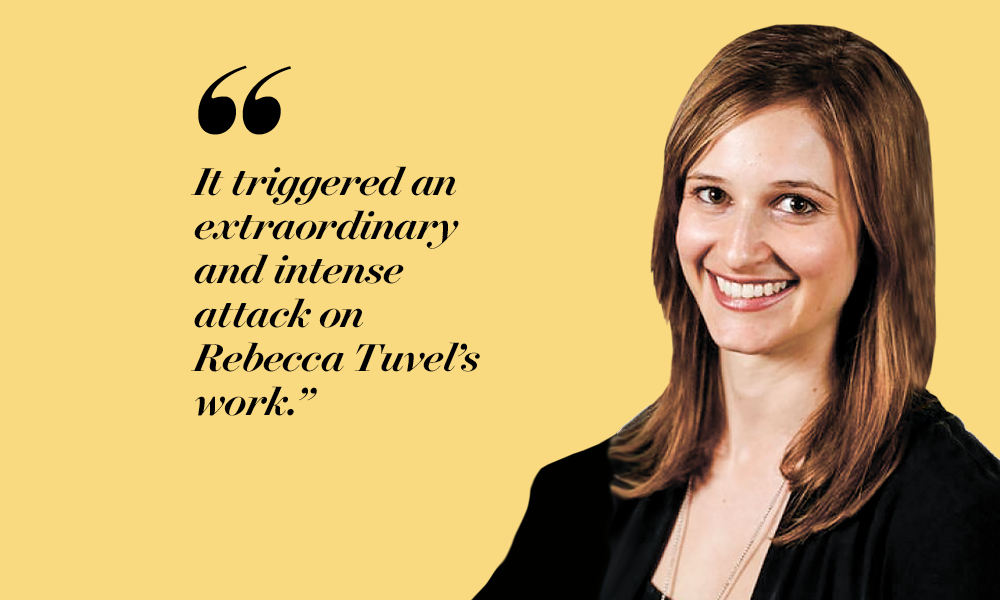Until recently, Rebecca Tuvel was a junior academic, unknown outside her field, teaching philosophy in a small university in the United States. However, her publication earlier this year of a journal article that spelt out a technical argument in support of trans-racialism (identifying with a race that doesn’t align with one’s ancestry) changed all that. It triggered an extraordinary and extraordinarily intense attack on her work and the publishing journal by fellow academics that spilled into the public imagination via The New York Times.
Tuvel’s alleged crime? Primarily, perpetrating “many harms” to various marginalised groups by not properly adopting the language these groups use to self-identify.
We are now in the place where appeals to any objective identity norms are viewed as an extraordinary burden.
I’ll leave it to the reader to reflect on the merits of Tuvel’s arguments (while ultimately I disagreed, I liked them philosophically), and those of her critics (to me, wildly overblown). Instead, what to many might seem simply a storm in a campus coffee cup, has led me to personally reflect on the much larger philosophical ground shift that has been brewing for more than a century: Just how free are we to create our individual identities and meanings?

Richard Shumack on the publication of an article about trans-racialism by US academic Rebecca Tuvel (pictured above). Rhodes College
For most of human history, most people simply assumed that our identity was objectively and normatively laid out for us, usually within a religious framework. All our usual identity markers, like species, gender, familial and social roles and responsibilities were taken to be both metaphysically essential to being human and ethically purposeful for both individuals and society to flourish.
The modern world, however, has seismically shifted to the polar opposite view. We are now in the place where appeals to any objective identity norms are viewed as an extraordinary burden. Indeed, it is a burden that is not merely crushing in terms of moral responsibility, but one that leads away from human flourishing rather than toward it.
How we got here philosophically is a long and involved story, but the searing prophet of the contemporary view was Friedrich Nietzsche. In Thus Spoke Zarathustra he laments the spiritual heaviness of a transcendent morality:
Man is difficult to discover, and to himself most difficult of all … He, however, has discovered himself who says: This is my good and evil.
It is the “mole” and the “dwarf,” he explains scornfully, who claim that what is good is good for all, what is evil is evil for all. Nietzsche relentlessly pursued his conviction of an ultimately meaningless universe without objective norms – free from what he calls “the spirit of gravity.” And make no mistake, Tuvel adopts this sort of foundation. She explicitly grounds her thinking in the replacement of metaphysics and objective morality with the almost total freedom of individual humans to create their own identity – with one concession: harm no one.
If the only social obligation is to do no harm, and if my right to autonomy can override even that, then ultimately and eternally we are alone. There is no guarantee we can rely on anybody else.
But it is not at all clear that the lightness promised by this contemporary ethic of self-determination is any more bearable than the alternatives it is fleeing. Inherent and unresolved tensions between individual rights and social responsibilities remain. And they raise fundamental questions about whether this habit of self-creation can truly make sense of the human experience.
Indeed, it is just these tensions that are being fleshed out in Tuvel’s experience. The vitriol directed at her attempts to be true to her academic self is a strong clue that the ethic is too thin to cope with conflicts between two self-determining agents heading in different directions. What do I do if my self-determination necessarily “harms” someone else’s?
Nietzsche, of course, recognised the problem. He displayed extraordinary honesty in wrestling with the existential implications involved, reaching the brutal conclusion that, for the ethic to be truly coherent, all social concessions must succumb to the individual’s self-creation. He saw clearly that the natural implication of this battle of the self-creators was one of survival of the fittest: victory would belong to an ubermensch (superman). In this sort of world, only the superman escapes the “spirit of gravity.” Choosing our own identities turns out to be less democratic than anticipated.
There’s another way that treating self-creation as ultimate turns out to be devastatingly and achingly heavy. This thin ethic offers no promise of any help. If the only social obligation is to do no harm, and if my right to autonomy can override even that, then ultimately and eternally we are alone. There is no guarantee we can rely on anybody else. I must find all the necessary resources within myself.
It is no accident that Jesus, too, couched his call in terms of existential heaviness:
Come to me, all you who are weary and burdened, and I will give you rest. Take my yoke upon you and learn from me, for I am gentle and humble in heart, and you will find rest for your souls. For my yoke is easy and my burden is light. (Matt. 11:28-30)
This promise is deeply old-fashioned. It is a call to find identity and purpose precisely in something other than yourself. Freedom is found in a bond of the service of the other; strength is found in resisting the desire to be “super” in favour of embracing humility; life is gained through sacrificially dying to self; and ultimately this makes sense because there really is a big picture story of the universe.
Rebecca Tuvel’s story shows this sort of thinking is out of fashion. But just a little reflection reveals Jesus’ wisdom.
As the old song goes:
He ain’t heavy, he’s my brother. If I’m laden at all, I’m laden with sadness that everyone’s heart isn’t filled with the gladness of love for one another.
Simply doing no harm may well be a lesser burden than loving sacrificially. But I suspect that intuitively we all long to bear and be borne by the heaviness of the richest ethic of love that’s available to us as humans.
Email This Story
Why not send this to a friend?




